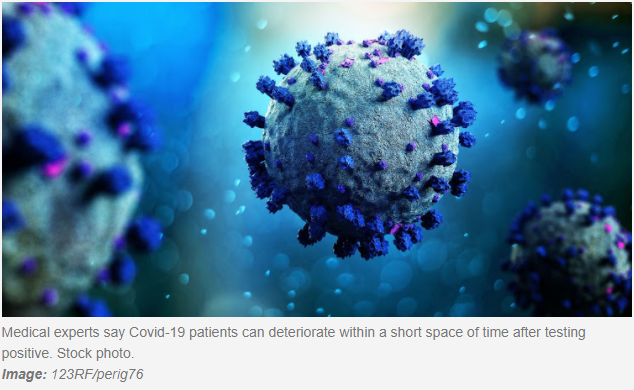Covid-19 manifests itself in various ways in patients and can sometimes lead to complications and the sudden deterioration of a patient's health, resulting in death.
Medical experts explained to TimesLIVE how complications can develop in a short space of time and what causes them.
“It is estimated that 20% of all infected patients will have moderate to severe disease requiring some medical support and a possible hospitalisation,” said Dr Neshaad Schrueder, head of specialist health services at Tygerberg hospital.
Schrueder said some patients may deteriorate within 14 days of testing positive, with a worsening pneumonia, and require hospitalisation.
“There are many instances where this deterioration is so rapid that the hospitals have seen many patients die on arrival.
“In our experience at Tygerberg Hospital, more than half of the admissions to hospital respond to treatment and are discharged after an average of seven days.
“However, some patients develop a more protracted course called ‘long Covid’, with persistent lung injury poorly responsive to current therapies, and remain oxygen-dependent for a longer period. It is many of these patients that have ultimately poor outcomes with a high inpatient mortality as well as a high post-discharge mortality.”
Patients with complications, Schrueder said, often developed multi-organ failure and experienced a “rapid demise” despite maximum therapy in an intensive care environment.
“This may happen to any hospitalised patient but is most often seen in our very obese and diabetic patients regardless of age. This deterioration is rapid and relentless in many patients who subsequently die and has been the source of most of the health-care worker emotional distress experienced during this pandemic.”
Covid-19, according to Schrueder, is also associated with other pathological processes such as dysfunctional blood clotting, with some patients at risk of clotting and others bleeding unexpectedly.
“Those that clot may develop vascular events associated with thromboembolism (blood clots in the vessels) such as strokes, heart attacks and clots to the lungs (pulmonary embolism).
“Patients with the risk factors mentioned above are already at high risk of these complications. These may also cause the sudden death of patients being treated for Covid. The therapies we use to prevent clotting and to treat patients with already present clots may also lead to bleeding complications. These complications may result in some patients dying from bleeding from the gastrointestinal tract or brain bleeds,” said Schrueder.
He said most patients that had died had severe pneumonia that was poorly responsive to therapy including mechanical ventilation.
“These patients despite all their attempts at physiological compensation by increasing their breathing rates and increasing their heart rates with the supportive care often reach a critical tipping point that results in a rapid deterioration of minutes to hours resulting in death.”
Dr Owen Kaluwa of the World Health Organisation (WHO) concurred that it was possible for a Covid-19 patient to suddenly deteriorate.
“However, each one of such unexpected deaths should be dealt with on the merits of their individual circumstances. Sudden deterioration resulting in death is one of the unusual presentations of Covid-19 that has been documented worldwide and there are studies currently being conducted to better understand this unfortunate situation,” Kaluwa said.
“There are many things that can cause the condition of a patient to suddenly worsen and they die. The current understanding is that Covid-19 affects many organs in the body that include the lungs, kidney, brain, heart and blood vessels. Some of the effects on these organs are not obvious or apparent until the disease has progressed,” he said.
Another possible reason for sudden deterioration of Covid-19 patients, Kaluwa said, was an abnormal immune response.
“The immune system in an attempt to protect the person produces some chemicals (cytokines) in excess. These chemicals cause swelling of the lungs, thereby depriving the person of oxygen. The failure to receive adequate oxygen will subsequently damage other organs such as the kidney, heart and brain, causing them to fail to function normally. Multiple organ failure can cause a patient’s condition to suddenly change for the worst.”
Read full article HERE






